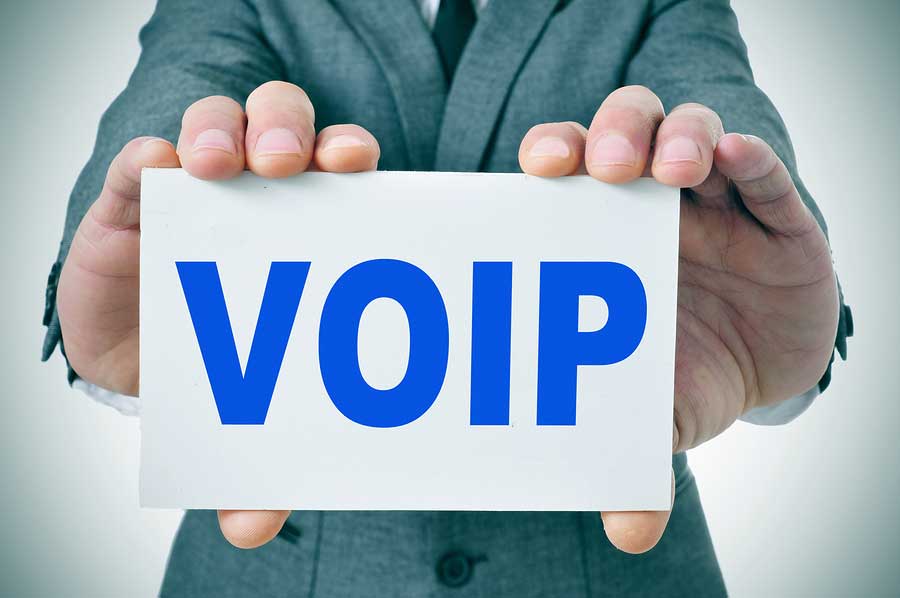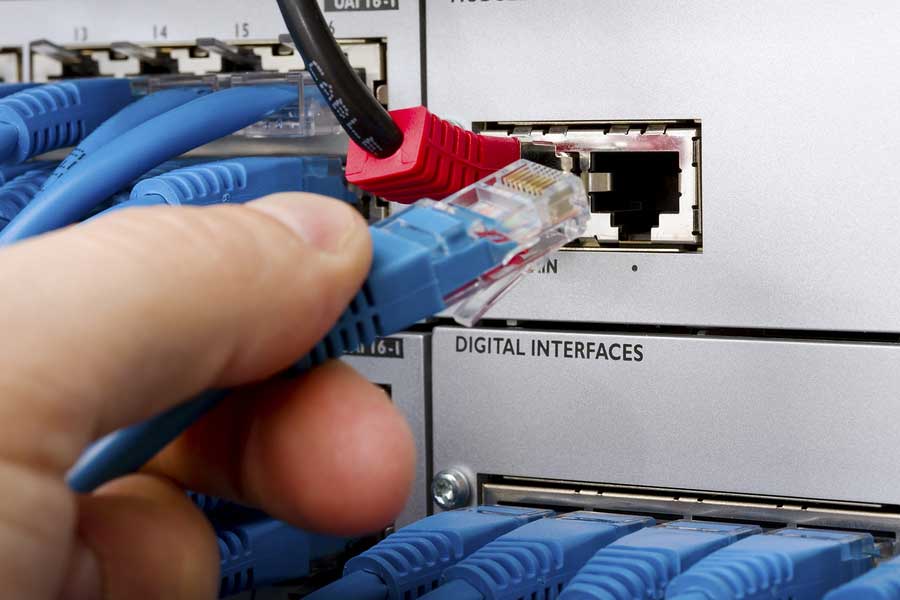Aptera Guide to Choosing and Installing Business Phone Systems
Having reliable telephone service is vital for businesses of every size. Employees need the ability to quickly communicate with each other and with customers. There are several different options for business phone systems. Traditional methods that connect to the public telephone network may be a good choice for some companies, whereas others may benefit from a internet-based service. When you are choosing the phone service for your business, it's important to consider all the options available and decide which one will bring the greatest benefits to your company.
Jump To Section

Choosing the right phone system for your business can help improve workflow.
What kind of business phone systems are available?
There are several types of phone service and each one has distinct advantages and associated costs. You'll need to determine which features you need for your business, such as voicemail, group calling and long distance service. The costs for additional features like these vary greatly depending on the type of service, and you don't want to be paying for features you will never use.
PBX Phone Systems - Private Branch Exchange
The most traditional type of business phone systems is a Private Branch Exchange (PBX) option. This is essentially a self-contained telephone network that is installed at the physical office site. All the phones at the office are connected to a "main" and this main is also connected directly into the public-switch telephone network (PSTN). There are usually several outside lines employees can use for calls and the main system is responsible for handling and routing all incoming and outgoing calls. In general, PBX service is provided by large telecommunications companies such as AT&T and MCI. Installation and setup fees can be around $4,000, but it's important to talk to a provider to get the exact cost details.
The biggest advantages of a PBX phone system are call quality and reliability. This system doesn't rely on an internet connection, so volume of users doesn't effect the call quality or availability of the system. A traditional phone system supports built-in extensions and gives your business a single number for customers to call. Additionally, your geographic location is tied directly to the phone service, so emergency number support is included. If you ever have to call the police or fire department, your call will automatically be routed to the correct location.
The biggest disadvantages of PBX business phone systems are the related to cost and capability. The equipment is expensive to install and repair. Additionally, PBX systems aren't easily scalable so if you end up expanding it can be expensive.

VOIP systems are a popular choice for most companies, but they're not the only choice.
VOIP Phone Systems
Commonly known as VoIP, voice of Internet protocol systems use the internet to support communications rather than using a traditional phone line. This is a popular solution, especially for smaller business as the associated costs are much less than those of a PBX system. Nearly all companies are already paying for internet service, so adding the phone system into that makes sense from a financial standpoint. Well-known VoIP providers are Vonage and Nextiva. Depending on your office's internet infrastructure, installation and setup can be relatively inexpensive.
Along with the price point, the other advantages of VoIP systems are related to the supported features. In general, popular features such as computer-technology integration (CTI), voicemail, conference calling and paging are all supported and often included in the price of monthly service. Traditional PBX service often charges high fees for additional features like these, whereas with VoIP most features are included in a standard setup. Additionally, VoIP service doesn't incur long-distance charges.
Small businesses and even companies run out of home offices can have the benefits of professional telephone service for much smaller setup and operating costs. Additionally, VoIP service is easily portable, so it's simple to take your service along to a new office as long as there is internet access. VoIP interfaces easily with mobile devices too, so you can even have your calls automatically transferred to your mobile device when you're away from your physical office.
The downsides of VoIP business phone systems are related to the internet. Because your phone service is based on the internet service, you can experience degraded call quality or dropped calls if your internet service is poor or overloaded. Additionally, your VoIP service may not support emergency calls, and some states require proper geographically-based emergency call service for businesses, so you need to make sure your system meets legal requirements.

Aptera connects you with a professional who can get your business phone system up and running today.
Key Systems
Another option is a key service unit (KSU). This method works well for small businesses, usually those with fewer than 50 employees. The operation is similar to a PBX service, with each employee's telephone routed into a main unit that processes incoming and outgoing calls. In many cases, a key system can be connected to existing wiring which can save a large amount of money on the installation costs. Additionally, each employee gets a dedicated extension and call holding and voicemail are typically included. Large telecommunications providers such as Avaya and AT&T may provide KSU service in your area. Costs for installation and set up may be around $4,500.
Key systems are generally easy to learn how to operate, unlike PBX systems that are quite complex. The repair costs associated with key systems are generally lower than those for PBX systems as well. However, there is not as much room for customization as with a full PBX system. Additionally, there are limitations on the number of lines that can be installed, unlike a VoIP system which offers virtually unlimited service.
KSU-Less Systems
As the name suggests, these business phone systems work in a way that is similar to a key service unit system, but without the addition of a main KSU box. Instead of a box that handles and routes all inbound and outbound calls, every call in handled by the individual phone associated with that line. This means that KSU-less systems are extremely inexpensive and an excellent choice for sole proprietorships or companies with fewer than 10 employees. KSU-less systems also support basic functions such as voicemail, call holding and paging. Many KSU-less systems rely on hardware manufactured by large companies such as Panasonic and Samsung. Installation generally costs around $3,000 but monthly service expenses are extremely low. You can get exact quote by contacting local providers.
The benefits of KSU-less systems are mostly related to cost. They're inexpensive to install and easily portable. The operating costs are also low. However, there is a limit to how many lines can be installed with a KSU-less system and it can be difficult to integrate this type of service with non-standard telephones and other devices such as fax machines.

Get the job done with a phone system that suites your business needs.
Pros and Cons of Installing a Business Phone System
There is a lot to consider when looking at business phone systems for your company. You have to take into account the installation and setup costs, as well as the monthly fees and cost of potential repairs. Additionally, you need to make sure your service will provide all the features and support your company needs.
Traditional PBX service: best call quality and reliability along with geographical emergency call service. Expensive to install and not portable.
VoIP service: numerous included features, mobile integration and lower operating costs. Risk of poor call quality and no geographical emergency service.
Key system: easy to install and use. Limit on number of lines and customization options.
KSU-less system: Low installation and operating costs, and easily portable. Limited number of lines and potentially difficult to integrate with other devices.

Phone business systems are ideal for all types of businesses, even small companies.
Let Aptera Help
Not sure where to begin? Let Aptera help by connecting you with qualified phone system professionals who specialize in installing and repairing systems in businesses. Whether you have a small company or own a multi story building, there is a telephone system that's right for your business. Contact us today to get started.